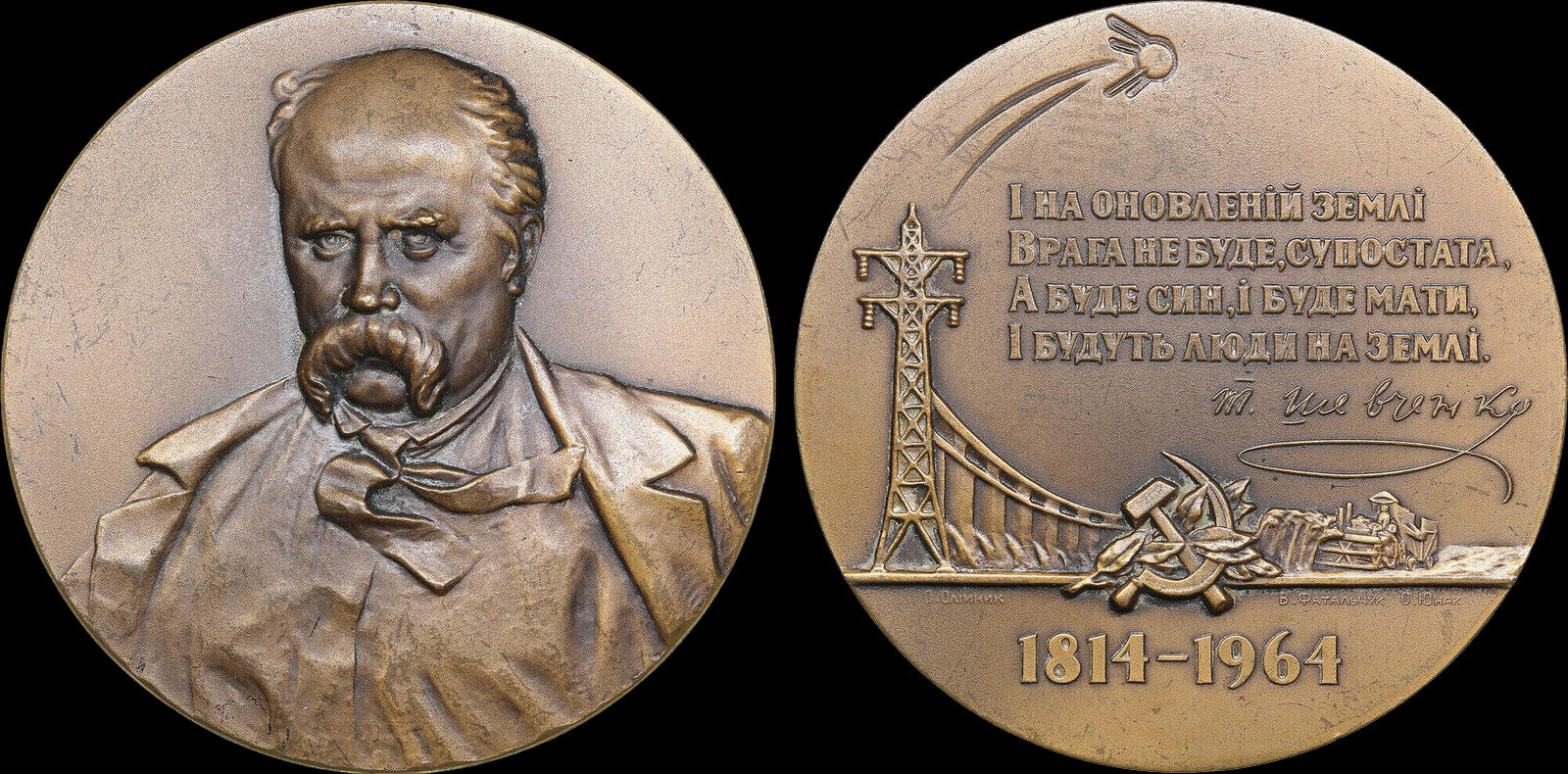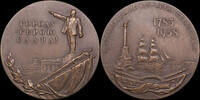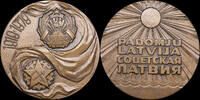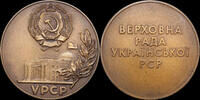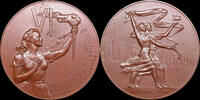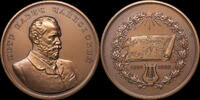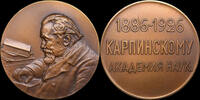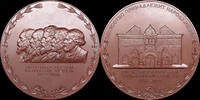MA-ID: 598502090
Customer feedback Numex OÜ
Excellent seller, highly recommended!
Thank You! Nice items for reasonable price, quick shipping! Excellent!!!
Ja, ich bin mit dem gekauften Geldschein vollig zufrieden. Danke.
M.Brindz...
Super Ware! Gerne wieder.
USSR / Russia 1964 medal - 150 years since the birth of T.G. Shevchenko AU
Numex OÜ 

9
On MA-Shops since 9 years
1195 ratings,
100 % Positive (last 24 months)
Worldwide shipping
69.86 US$60,00 EUR
Import tax may be added
+ 5.82 US$ shipping ( to United States )
Delivery time: 19 - 22 days
+ 5.82 US$ shipping ( to United States )
| Customer Support 941.210.2677 |
| Payment methods |
| Wire Transfer |
Diameter 65 mm. Mintage 4189 pc. LMD. Шкурко, Салыков# 373.
"150 лет со дня рождения Т.Г.Шевченко"
Taras Hryhorovych Shevchenko: The Bard of Ukraine
Taras Hryhorovych Shevchenko, often hailed as the national poet of Ukraine, was born on March 9, 1814, in the village of Moryntsi, then part of the Russian Empire. Known affectionately as Kobzar, a reference to the traditional Ukrainian bard, Shevchenko's life and work encapsulated the spirit of Ukrainian identity, resistance, and cultural revival.
Early Life and Artistic Beginnings
Shevchenko's early life was marked by hardship. Born into serfdom, he was orphaned early and served in various households, including that of his future patron, Vasyl Engelhardt. Engelhardt recognized Shevchenko's talent and facilitated his education, eventually buying his freedom in 1838. This pivotal act allowed Shevchenko to enroll in the Academy of Arts in St. Petersburg, where he thrived as both a poet and a painter.
Literary Contributions
Shevchenko's most famous work, "Kobzar," first published in 1840, is a collection of poetry that remains a cornerstone of Ukrainian literature. His poems, written predominantly in Ukrainian at a time when the language was suppressed, spoke powerfully of freedom, the beauty of the Ukrainian landscape, and the plight of his people under oppression. Works like "Testament" and "Caucasus" are not only literary masterpieces but also calls for national awakening and unity.
Political Activism and Exile
His outspokenness against serfdom and Russian imperialism led to his arrest in 1847. Shevchenko was exiled to a remote part of the Russian Empire, forbidden from writing or painting. Despite these harsh conditions, his spirit was unbroken. His exile ended in 1857, but he continued to face surveillance and censorship.
Legacy
Taras Shevchenko died on March 10, 1861, in St. Petersburg, but his influence only grew posthumously. His burial place in Ukraine became a national shrine, and his works were instrumental during times of political upheaval, including the 20th-century struggles for Ukrainian independence. Shevchenko's legacy extends beyond literature; his art, both in painting and poetry, continues to inspire national pride and cultural identity.
Cultural Impact
Today, Taras Shevchenko is celebrated not only in Ukraine but worldwide among the Ukrainian diaspora. His birthday is marked by Shevchenko's Day, a cultural event that highlights Ukrainian heritage and language. His influence is seen in literature, music, visual arts, and even political movements, making him a timeless figure in the tapestry of Ukrainian culture.
In summary, Taras Shevchenko's life and work are a testament to the enduring power of art in the face of adversity. His contributions to Ukrainian culture and identity have made him an indelible part of the national psyche, a poet whose words continue to resonate with the call for freedom and cultural preservation.
"150 лет со дня рождения Т.Г.Шевченко"
Taras Hryhorovych Shevchenko: The Bard of Ukraine
Taras Hryhorovych Shevchenko, often hailed as the national poet of Ukraine, was born on March 9, 1814, in the village of Moryntsi, then part of the Russian Empire. Known affectionately as Kobzar, a reference to the traditional Ukrainian bard, Shevchenko's life and work encapsulated the spirit of Ukrainian identity, resistance, and cultural revival.
Early Life and Artistic Beginnings
Shevchenko's early life was marked by hardship. Born into serfdom, he was orphaned early and served in various households, including that of his future patron, Vasyl Engelhardt. Engelhardt recognized Shevchenko's talent and facilitated his education, eventually buying his freedom in 1838. This pivotal act allowed Shevchenko to enroll in the Academy of Arts in St. Petersburg, where he thrived as both a poet and a painter.
Literary Contributions
Shevchenko's most famous work, "Kobzar," first published in 1840, is a collection of poetry that remains a cornerstone of Ukrainian literature. His poems, written predominantly in Ukrainian at a time when the language was suppressed, spoke powerfully of freedom, the beauty of the Ukrainian landscape, and the plight of his people under oppression. Works like "Testament" and "Caucasus" are not only literary masterpieces but also calls for national awakening and unity.
Political Activism and Exile
His outspokenness against serfdom and Russian imperialism led to his arrest in 1847. Shevchenko was exiled to a remote part of the Russian Empire, forbidden from writing or painting. Despite these harsh conditions, his spirit was unbroken. His exile ended in 1857, but he continued to face surveillance and censorship.
Legacy
Taras Shevchenko died on March 10, 1861, in St. Petersburg, but his influence only grew posthumously. His burial place in Ukraine became a national shrine, and his works were instrumental during times of political upheaval, including the 20th-century struggles for Ukrainian independence. Shevchenko's legacy extends beyond literature; his art, both in painting and poetry, continues to inspire national pride and cultural identity.
Cultural Impact
Today, Taras Shevchenko is celebrated not only in Ukraine but worldwide among the Ukrainian diaspora. His birthday is marked by Shevchenko's Day, a cultural event that highlights Ukrainian heritage and language. His influence is seen in literature, music, visual arts, and even political movements, making him a timeless figure in the tapestry of Ukrainian culture.
In summary, Taras Shevchenko's life and work are a testament to the enduring power of art in the face of adversity. His contributions to Ukrainian culture and identity have made him an indelible part of the national psyche, a poet whose words continue to resonate with the call for freedom and cultural preservation.
Info / FAQ
| Shipping fees | ||||
|---|---|---|---|---|
| 1.16 US$ to 58.21 US$ | 58.21 US$ to 232.86 US$ | 232.86 US$ to 582.15 US$ | over 582.15 US$ | |
| China | 13.97 US$ | n/a | n/a | n/a |
| Germany | 5.82 US$ | 5.82 US$ | 5.82 US$ | 17.46 US$ |
| Estonia | 5.82 US$ | 5.82 US$ | 5.82 US$ | 13.97 US$ |
| United Kingdom | 5.82 US$ | 5.82 US$ | 5.82 US$ | 29.11 US$ |
| United States | 5.82 US$ | 5.82 US$ | 5.82 US$ | 46.57 US$ |
| European Union | 5.82 US$ | 5.82 US$ | 5.82 US$ | 29.11 US$ |
| World | 13.97 US$ | 17.46 US$ | 116.43 US$ | 116.43 US$ |
Information
Online orders are welcome as always and will be shipped directly.
|
Seller Home | 0Shopping cart | Terms of sale | Contact | MA Terms of sale | Privacy policy | Warranty | MA-Shops New Items Copyright ® 2001-2025, MA-SHOPS Coins All Rights Reserved. Designated trademarks and brands are the property of their respective owners. |
 Buy coins with warranty
Buy coins with warranty



